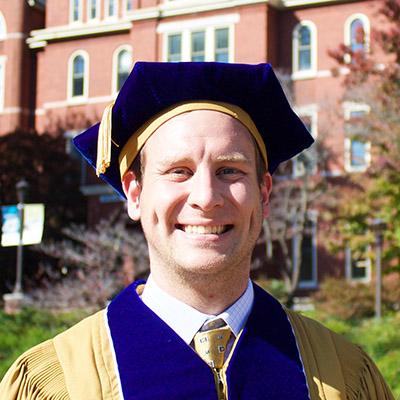
Robert Clark
What’s your next adventure?
I’ll be working full-time with General Electric (GE) Aerospace and starting a part-time lecturer position with the AE School here at Georgia Tech.
What are you most looking forward to?
I’m most looking forward to getting to teach in the classroom and being with students to help them on their learning adventure. Seeing that light bulb moment is one of the most rewarding things you can do, so I’m extremely excited to stay here at Georgia Tech teaching.
I’m also looking forward to returning to full-time work at GE Aerospace. I previously interned with GE when I was pursuing my undergraduate degree at Purdue, and in 2015 I began work there full-time. I left GE back in 2019 temporarily because I wanted to pursue my Ph.D. before I got too deep into my career. I love my career at GE working on exciting new propulsion technologies and designing aircraft engines, so being able to split my time between teaching and working in industry and doing two things I love is a great opportunity for me.
Did you have any previous co-op, internship, or research experience in this area?
My first internship was with Lockheed Martin in 2012 as a summer intern working on technology mapping between Lockheed and Sandia National Lab. I later interned with GE Aviation in 2014 as a mechanical engineering intern, working on testing nacelle anti-ice valves for the LEAP engine program. After that internship, I had the opportunity to work at GE Aviation full-time as part of the Edison Engineering Development Program (EEDP). I worked at GE full-time for four years while also getting a master’s degree at Ohio State through the EEDP program.
In terms of research, I didn’t have a lot of aerospace engineering research background before coming to Georgia Tech. At Ohio State I researched deposition in the hot section of aircraft engines, but that was only for a year. Most of my technical experience was from my internships and working in industry at GE before coming back to grad school full-time.
How did your educational experience at GT-AE help you achieve your goal?
I wanted to get my Ph.D. because I want to be able to teach, so I tried to get into every kind of teaching opportunity possible. I first started in the Tech to Teach Program here at Georgia Tech, which prepares graduate students and postdocs for college teaching positions. During my time here in aerospace engineering at Georgia Tech, I also found that the AE professors were really helpful at getting me additional exposure in the classroom.
Dr. Jechiel Jagoda let me come in and teach some of his undergraduate thermodynamics classes and Dr. Jimmy Tai also let me come in and guest lecture a few times in his graduate propulsion system design class. I was also lucky enough to serve as the instructor of record for COE 2001: Statics and AE 3531: Controls, which were both very rewarding teaching experiences. The classes I taught reinforced my desire to teach in aerospace engineering, and the coursework I took here at GT-AE helped improve my overall fundamental aircraft and engine design knowledge for my career at GE.
What advice would you give to an underclassman who would like to follow the same path?
Get to know your professors. Whether you want to go into teaching or go into industry (or both, like I did), get to know your professors because they are an invaluable resource. Even if you don’t need help with a problem, go to office hours so that your professor knows who you are in a class of 50 or 100 students. It’s hard for professors to get to know everyone, so try to build that personal connection because 1) you’re going to learn the material more if you are engaged 2) if you need a letter of recommendation, they will be able to pull specific examples and have a personal connection with you.
Don’t be afraid to try and fail at different experiences. I’ll be honest, none of my internships were areas that I ultimately saw myself working in from a technical enjoyment perspective. However, the process of interning and getting experience was just as valuable as finding an internship in an area that I loved. It’s a great way to narrow down what you’d like to do later on in your career and as a student you shouldn’t be afraid or upset if you find out that a certain internship is not what you want to do. No matter what, it will help you shape your future. It’s better to find out that it’s not a match in a three-month internship than in a full-time position.